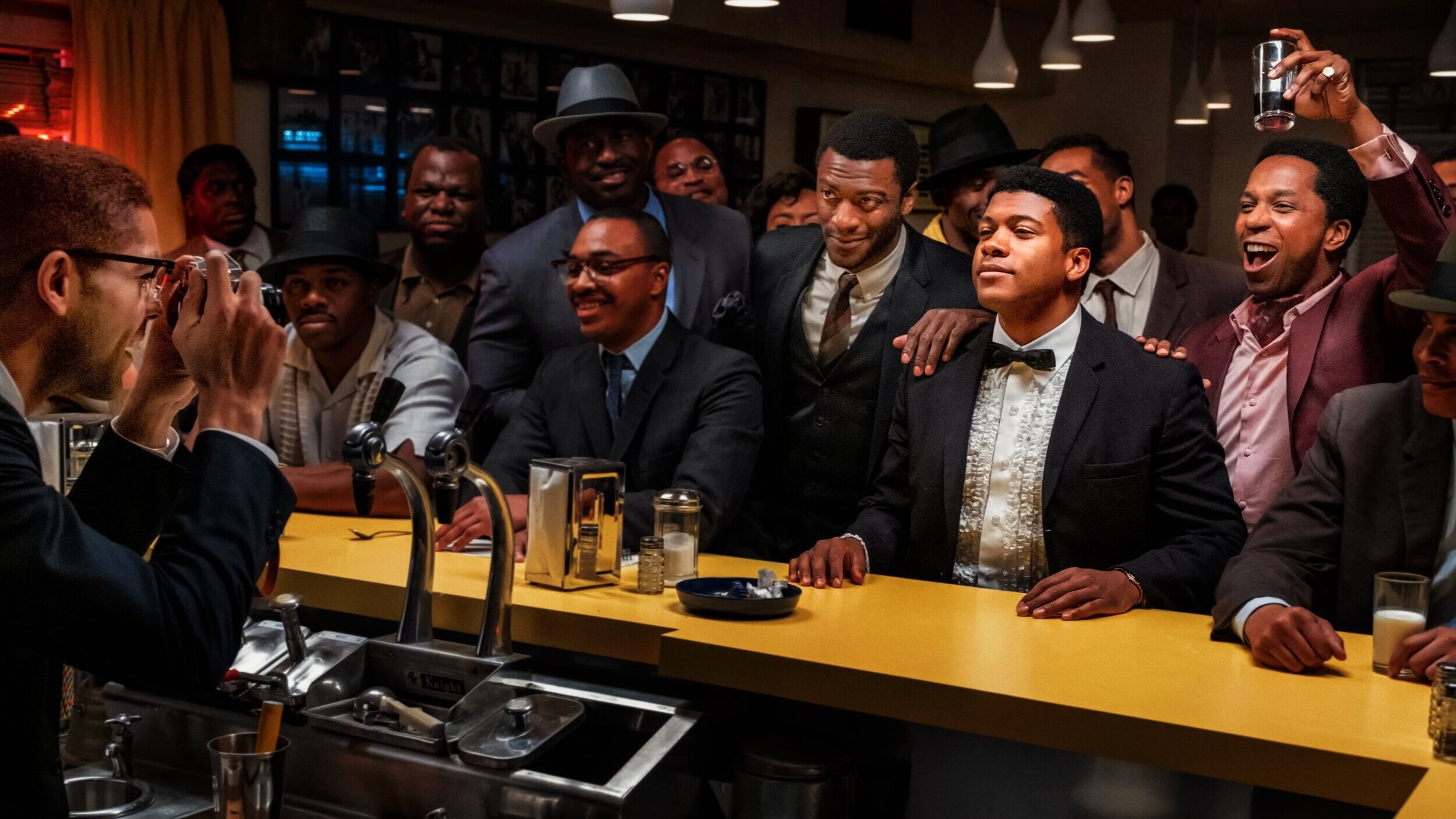One Night in Miami
Amazon StudiosDirected by Regina King in her feature debut and adapted by Kemp Powers from his own stage play, One Night in Miami recounts an historic meeting between four prominent African Americans: Malcolm X (Kingsley Ben-Adir), Muhammad Ali (Eli Goree), Jim Brown (Aldis Hodge) and Sam Cooke (Eli Goree). They spend the night together, likely celebrating Ali’s victory over Sonny Liston which earned him his first championship belt in, and emerged changed. This story attempts to speculate what happened behind closed doors on that fateful night.
The filmmakers swiftly dispose with any historically-accurate garnish surrounding the championship bout and immediately limit the parameters of the narrative to a single location populated with four monumental personalities. This successfully removes any connotations of a formal biopic, because nobody knows what happened in that meeting. And since it is likely to remain a complete mystery, it lends itself perfectly to facilitate a discussion about racial inequality, civil rights, and understanding different kinds of power these men held in their grasp at the time.
This is also where One Night in Miami runs into serious problems, because it fails to capitalise on the freedom it has to forge its enigmatic premise into a compelling and timely conversation about the African American experience. In fact, the film falls victim to a ‘paralysis of choice’ because it has the potential to tap into so many powerful ideas, but it waters down its own momentum by virtue of not being able to choose a firm focus for its story. This results in the film being structurally shapeless, as the narrative lacks an easily discernible three-act outline and instead becomes a series of vignettes folding into one another, driven by inertia as opposed to a compelling character conflict.
As a result, it is difficult for the viewer to latch onto any of these men because they simply aren’t real. Although the actors have clearly spent a considerable amount of time researching their respective characters, internalising their mannerisms, accents and charm, they all speak with the same voice – the voice of Kemp Powers. What they talk about – the Civil Rights Movement and their role in undoing centuries of oppression against their ilk – lacks gravity and occasionally feels like a dramatic experiment, not a fruit of generational anger distilled into dialogue. It is almost impossible to imagine that such distinctly powerful personalities would interact in such a forgettable manner, but they do. They recite their lines with great care and occasionally hone in on a poignant remark, but they consistently fail to shatter the barrier between the stage and reality needed to speak directly to the viewer – something Spike Lee’s Da 5 Bloods does effortlessly, for example.
This is where competent and assured direction would definitely not go amiss. Unfortunately, Regina King, technically capable as she is, seems completely overwhelmed by Powers’ text and unable to challenge its indulgences. In fact, it feels as though she took a back seat and ‘let the story tell itself’ because One Night in Miami is lethargic, visually bland and artistically subservient to the script. It is as though King was afraid her directorial voice would overshadow the mission. Consequently, the film fails to engage the audience in more than one way. Neither does it leave the fish tank of its own theatricality to prod at the viewer’s conscience nor does it transport them fully to its universe and make them a part of the experience.
It is quite clear that One Night In Miami has the potential to be an important film and was undoubtedly engineered to transcend the confines of digestible entertainment. After all, it handles a timely subject matter and uses four great historical figures as vessels to convey it. Unfortunately, it buckles under its own weight and drowns its thematic topography in the swamp of verbose exchanges that fail to viscerally connect with the cause the film was supposed to advance. Sure, it has its moments of flair and genuine gravitas or fleeting poignancy, but they are few and far between. One Night in Miami is not the rapacious exposé it could have been in the hands of someone like Spike Lee, Ava DuVernay or Steve McQueen, but a declawed and inoffensive sermon delivered solely at the converted.


